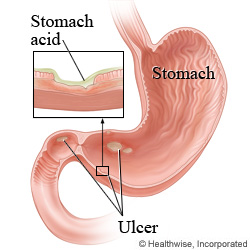
Overview
Your child's test shows the presence of Helicobacter pylori (H. pylori), a kind of bacterium that lives in the lining of the stomach. Many people have H. pylori in their stomachs and do not develop problems. But sometimes H. pylori causes an upset stomach or a sore (ulcer) in the stomach lining. Most stomach ulcers are caused by H. pylori. Symptoms of an ulcer include gnawing or burning pain in the belly that can last minutes or hours. Eating food or taking antacids helps relieve the pain, but the symptoms may come back after a while. Antibiotic medicine can cure an H. pylori infection.
Follow-up care is a key part of your child's treatment and safety. Be sure to make and go to all appointments, and call your doctor if your child is having problems. It's also a good idea to know your child's test results and keep a list of the medicines your child takes.
How can you care for your child at home?
- If the doctor prescribed antibiotics for your child, give them as directed. Do not stop using them just because your child feels better. Your child needs to take the full course of antibiotics.
- If your doctor prescribes other medicine, have your child take it exactly as prescribed. Call your doctor if you think your child is having a problem with their medicine. You will get more details on the specific medicine your doctor prescribes.
- Serve smaller meals more often, instead of three larger meals a day.
- Avoid serving foods that bother your child. And avoid things that can irritate their stomach lining, such as black pepper or items with caffeine (soda, tea, and chocolate).
- Keep your child away from smoke. Do not smoke or let anyone else smoke around your child or in your house. Smoke slows the healing of your child's ulcer and can make an ulcer come back.
- Do not give your child ibuprofen, aspirin, or other anti-inflammatory medicines, because they can irritate the stomach. If your child needs pain medicine, try acetaminophen (Tylenol).
- Do not give your child two or more pain medicines at the same time unless the doctor told you to. Many pain medicines have acetaminophen, which is Tylenol. Too much acetaminophen (Tylenol) can be harmful.
When should you call for help?
Call 911 anytime you think your child may need emergency care. For example, call if:
- Your child's stools are maroon or very bloody.
- Your child vomits blood or what looks like coffee grounds.
Call your doctor now or seek immediate medical care if:
- Your child has new or worse belly pain.
- Your child's stools are black and look like tar, or they have streaks of blood.
- Your child is vomiting.
Watch closely for changes in your child's health, and be sure to contact your doctor if:
- Your child does not get better as expected.
Where can you learn more?
Go to http://www.healthwise.net/patientEd
Enter C401 in the search box to learn more about "H. Pylori Bacterial Infection in Children: Care Instructions".
Current as of: June 12, 2023
Author: Healthwise Staff
Clinical Review Board
All Healthwise education is reviewed by a team that includes physicians, nurses, advanced practitioners, registered dieticians, and other healthcare professionals.

